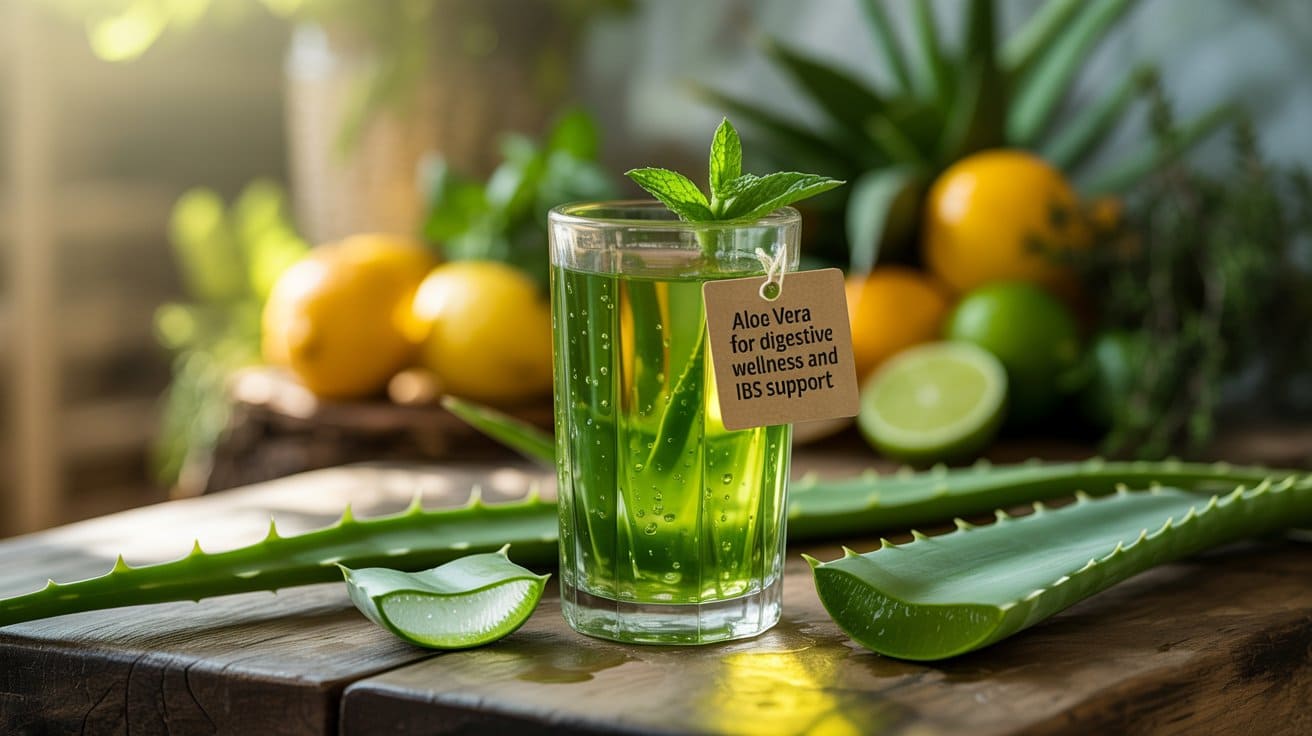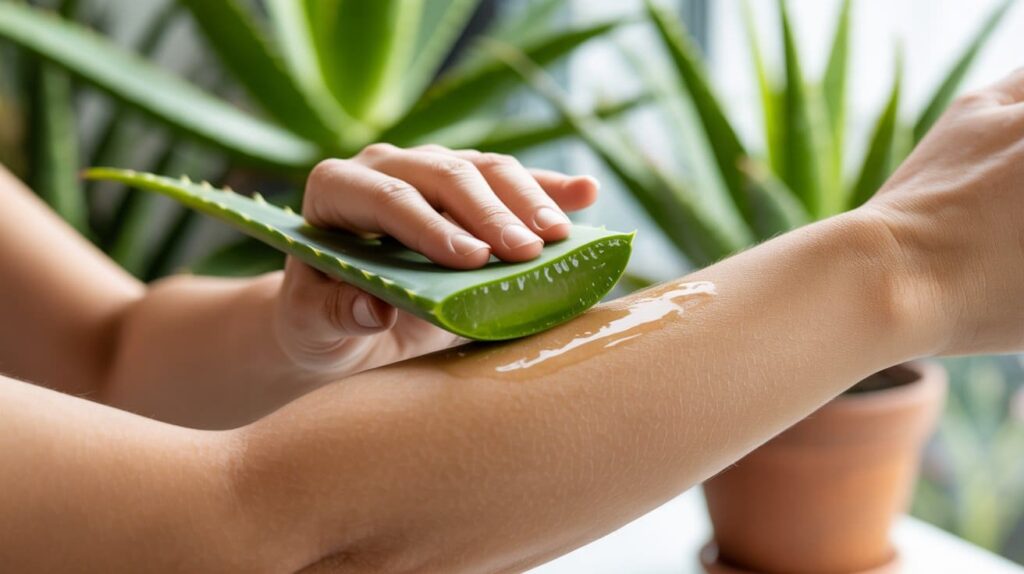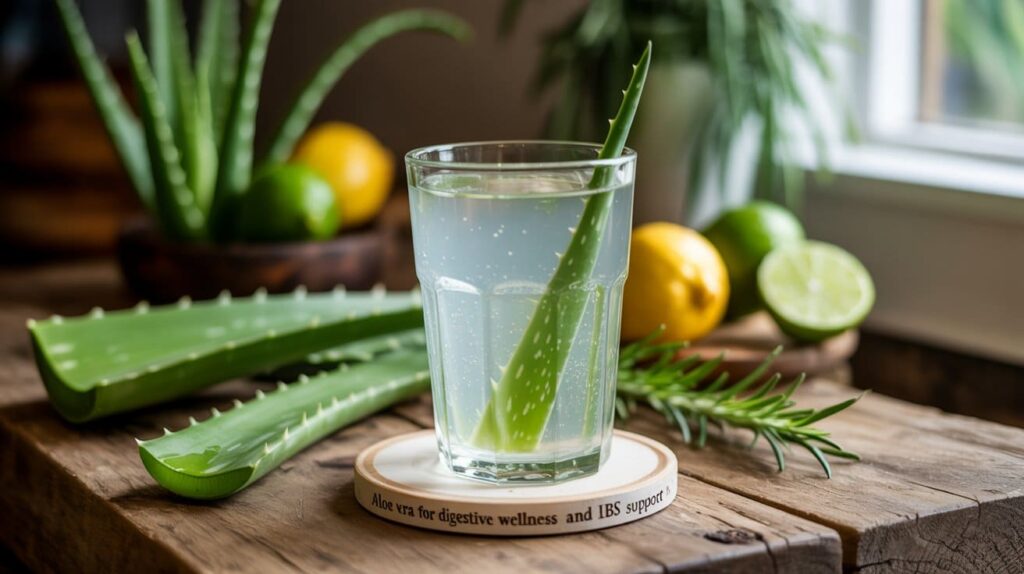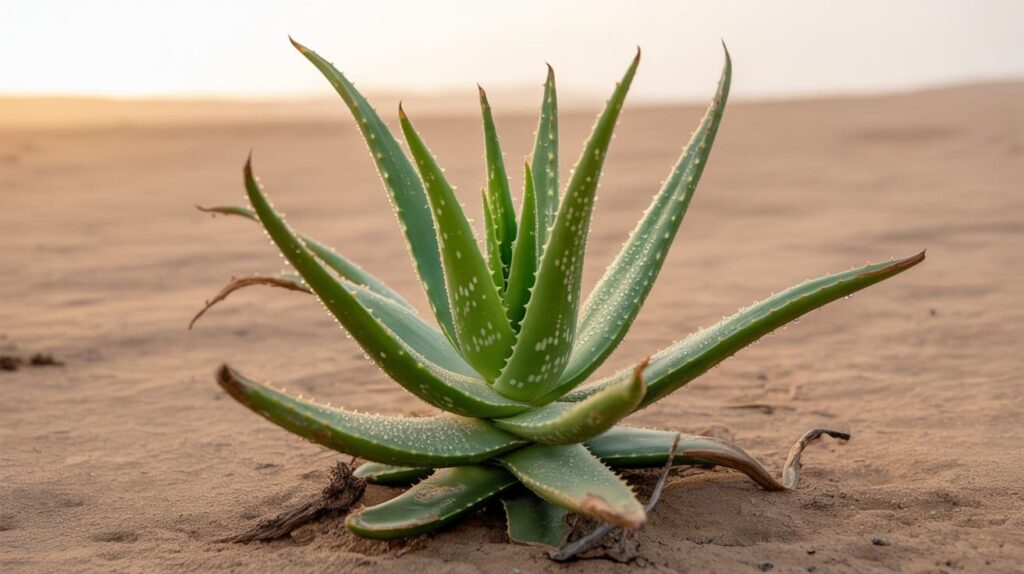
Introduction
Aloe vera (Aloe barbadensis Miller) is a succulent plant long prized for its medicinal, cosmetic, and nutritional properties. Native to arid and semi-arid regions and widely cultivated today across Africa, the Arabian Peninsula, India, and beyond, Aloe vera’s thick, gel-filled leaves contain dozens of bioactive compounds that modern science continues to investigate. This article reviews the plant’s botanical habitat, phytochemistry, and the clinical evidence for its primary therapeutic uses — including wound and burn healing, skin care, digestive health, blood sugar regulation, and immune modulation — citing recent, high-quality studies and reviews from researchers in Asia, Europe, and the Americas. The text is SEO-optimized for keywords such as Aloe vera, wound healing, anti-inflammatory, Aloe and diabetes, and acemannan immune, and contains key points, a summary evidence table, and references to reputable sources (Wikipedia, peer-reviewed journals, and health agencies).

Body
Habitat, Cultivation, and Botanical Notes
Aloe vera is a drought-tolerant succulent that thrives in well-drained sandy soils and hot climates. Its leaf anatomy — thick, water-storing parenchyma surrounding a viscous gel — is an adaptation to arid environments. Agronomic and ecological studies note Aloe’s preference for sandy substrates and its tolerance of high temperatures, which explains its widespread cultivation from North Africa and the Arabian Peninsula to India and parts of the Americas. WikipédiaSciELO
What’s inside an Aloe leaf? — Phytochemistry at a glance
Aloe gel and whole-leaf extracts contain dozens to hundreds of compounds. Major groups include:
- Polysaccharides (notably acemannan)
- Anthraquinones (e.g., aloin)
- Vitamins (A, C, E, some B-vitamins)
- Minerals (calcium, magnesium, zinc, chromium)
- Amino acids (≈20, including essential amino acids)
- Enzymes (amylase, cellulase)
- Phenolics and flavonoids (antioxidant activity)
These constituents underlie Aloe’s anti-inflammatory, antimicrobial, wound-healing, and immunomodulatory activities reported in laboratory and clinical research. Wiley Online LibraryPMC

Clinical Uses and Evidence
Below we summarize the main therapeutic areas where Aloe vera has been studied and give representative, recent studies from different world regions.
1. Wound and burn healing — strongest clinical signal
Topical Aloe vera gel has been extensively studied in wound and burn care. Multiple randomized trials and systematic reviews conclude that Aloe preparations can accelerate healing time and reduce pain in superficial and some partial-thickness burns compared with standard topical treatments. A 2024 systematic review and meta-analysis found a statistically significant reduction in mean wound-healing time for burns treated with Aloe. Other recent reviews (2022–2023) support Aloe-based dressings and hydrogels as promising adjuncts for wound care. Oxford AcademicPMCMDPI
2. Skin care and dermatology
Topical Aloe is included widely in cosmetics for moisturization, irritation relief, and treatment of minor dermatitis and acne. Clinical trials and cosmetic science studies report improvements in skin hydration and elasticity after use of Aloe extracts. Larger dermatological trials show mixed but generally positive results for mild inflammatory skin conditions; formulation and product quality strongly influence outcomes. ScienceDirectPMC

3. Digestive health — IBS, constipation, and gut microbiota
Oral Aloe preparations (juices, gels, capsules) have been used to relieve constipation because of anthraquinone compounds (e.g., aloin). Some clinical trials indicate symptomatic improvement for patients with Irritable Bowel Syndrome (IBS) or inflammatory bowel conditions, although quality and heterogeneity of trials vary. Preclinical and human studies also suggest Aloe may positively influence gut microbiota and intestinal mucosal healing — but caution is warranted because formulations differ and long-term safety data are limited. PMCNCCIH
4. Blood sugar regulation in prediabetes and type 2 diabetes
Multiple controlled trials and meta-analyses report modest reductions in fasting blood glucose with Aloe extracts or juice in persons with prediabetes and type 2 diabetes. A 2022 systematic review and meta-analysis found a statistically significant reduction in fasting glucose across pooled trials, but noted high heterogeneity and variability in doses and product standardization. Recent small clinical trials (Asia, Middle East) also support glucose-lowering effects, while emphasizing the need for standardized extracts and safety monitoring. jppres.comPMC
5. Immune modulation — the role of acemannan
Acemannan, a major polysaccharide in Aloe vera gel, has been shown in laboratory and animal studies to activate macrophages, dendritic cells, and NK cells, prompting cytokine production and enhancing innate immune functions. Clinical translations are limited but promising for topical immune modulation and as a supportive agent in wound healing. Reviews discuss acemannan’s pharmacodynamics and potential therapeutic windows for topical and oral administration. PubMedWiley Online Library
6. Anti-cancer and anti-proliferative findings — preliminary
In vitro studies indicate that certain anthraquinones and other constituents can inhibit cancer cell proliferation in culture. These preclinical results are intriguing but are not evidence of clinical anti-cancer efficacy in humans; further rigorous translational and clinical research is required before any therapeutic claims. Wiley Online Library

Safety, product quality, and regulatory notes
- Topical use of properly processed Aloe gel is generally well tolerated; allergic contact dermatitis can occur in sensitive individuals.
- Oral use (whole-leaf extracts containing anthraquinones) carries more safety concerns: long-term ingestion of non-decolorized whole-leaf products may cause gastrointestinal upset, electrolyte disturbances, and potential hepatotoxicity reported in isolated cases. Regulatory agencies have restricted certain uses — for example, some anthraquinone laxatives have faced regulatory scrutiny. Users with diabetes, pregnant or breastfeeding women, and people on multiple medications should consult clinicians before oral use. The U.S. National Center for Complementary and Integrative Health (NCCIH) provides an overview of safety and uses. NCCIHWikipédia
Table : Summary of Evidence by Condition
| Condition / Use | Evidence Level (2020–2024) | Representative recent sources |
|---|---|---|
| Burns & wound healing (topical) | Moderate–High (consistent meta-analytic support) | Huang et al., JBCR 2024; Levin et al., 2022. Oxford AcademicPMC |
| Skin hydration / cosmetic | Moderate | Cosmetic and clinical trials; Zhu 2024. ScienceDirect |
| IBS / gut health | Low–Moderate (variable trials) | Hekmatpou 2019 review; NCCIH summary. PMCNCCIH |
| Type 2 diabetes / fasting glucose | Low–Moderate (small RCTs, meta-analysis with heterogeneity) | JPPRes meta-analysis 2022; Prakash 2023. jppres.comPMC |
| Immune modulation (acemannan) | Preclinical → Early clinical | Lee et al. (acemannan studies); Darzi review 2021. PubMedPMC |
| Anti-cancer | Preclinical only | Pharmacodynamic and in vitro reviews. Wiley Online Library |
Practical applications & best practices
- Choose decolorized, standardized Aloe extracts for oral formulations (to reduce anthraquinone load) and certified topical gels for burns and wound care.
- Watch for product variability — not all Aloe products are equivalent; look for third-party quality testing and clear labeling of aloin/anthraquinone content.
- Dosage and duration matter: clinical benefits (e.g., glycemic effects) in trials often used standardized doses for ≥8 weeks. Meta-analyses warn that heterogeneity in dose and formulation complicates recommendations. jppres.comMDPI
Conclusion
Aloe vera is a botanical with a long history and a growing evidence base. Modern research — spanning Asia, Europe, and the Americas — supports topical Aloe gel for wound and burn healing (the strongest clinical area to date), shows promising but heterogeneous results for skin care, digestive health, and blood sugar modulation, and documents robust immunomodulatory activity of polysaccharide fractions such as acemannan in preclinical models. Safety and efficacy depend heavily on product quality, processing, and formulation; while topical uses are generally safe, oral intake should be approached cautiously and under medical guidance. Continued well-designed clinical trials with standardized, authenticated Aloe preparations are needed to move preliminary findings into routine clinical practice.
Key Points (SEO-friendly bullets)
- Aloe vera contains acemannan, aloin, anthraquinones, vitamins, minerals, and enzymes. Wiley Online Library
- Topical Aloe has the best clinical evidence for burn and wound healing. Oxford Academic
- Oral Aloe may lower fasting glucose in type 2 diabetes, but trials vary and standardization is needed. jppres.comPMC
- Aloe polysaccharides modulate immune cells in preclinical studies (potential clinical relevance). PubMedPMC
- Prioritize third-party tested, decolorized products for oral use; consult healthcare providers before use. NCCIH
Figure (conceptual)
Figure 1 — Schematic : Key active fractions in Aloe vera gel and matched therapeutic effects
- Polysaccharides (acemannan) → immune activation, wound repair. PubMed
- Anthraquinones (aloin) → laxative effects; antimicrobial activity at some concentrations. Wiley Online Library
- Phenolics / flavonoids → antioxidant, anti-inflammatory effects. Wiley Online Library
(Note : Figure provided here as a conceptual legend; graphical assets can be prepared on request.)
Selected References & Further Reading
- Huang YN, et al. Effects of Aloe vera on Burn Injuries: A Systematic Review and Meta-analysis. J Burn Care Res. 2024. Oxford Academic
- Levin NJ, et al. A Systematic Review and Meta-Analysis Comparing Burn Treatments Including Aloe. 2022. PMC
- Chelu M, et al. Aloe vera-Based Hydrogels for Wound Healing. Polymers (MDPI). 2023. MDPI
- Boudreau MD, Beland FA. An Evaluation of the Biological and Toxicological Properties of Aloe barbadensis Miller (Aloe vera). Food Chem Toxicol. 2006. PMC
- JPPRes meta-analysis (2022). The effect of Aloe vera on fasting blood glucose levels in pre-diabetes and type 2 diabetes mellitus. (Systematic review & meta-analysis). jppres.com
- Prakash D., et al. Effect of aloe vera juice on type 2 diabetes mellitus. 2023 (clinical study). PMC
- Darzi S., et al. Immunobiology and Application of Aloe vera-Based Preparations. 2021 review. PMC
- Lee JK., et al. Acemannan immunomodulatory studies (dendritic cell activation). 2001. PubMed
- Vogler BK, Ernst E. Aloe vera: a systematic review of its clinical effectiveness. Br J Gen Pract. 1999. PMC
- Aloe (Wikipedia) — general botanical and ethnobotanical summary. Wikipédia
- National Center for Complementary and Integrative Health (NCCIH). Aloe Vera: Usefulness and Safety. U.S. NIH. NCCIH





